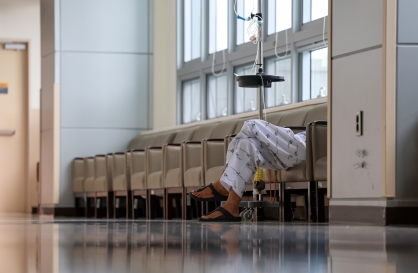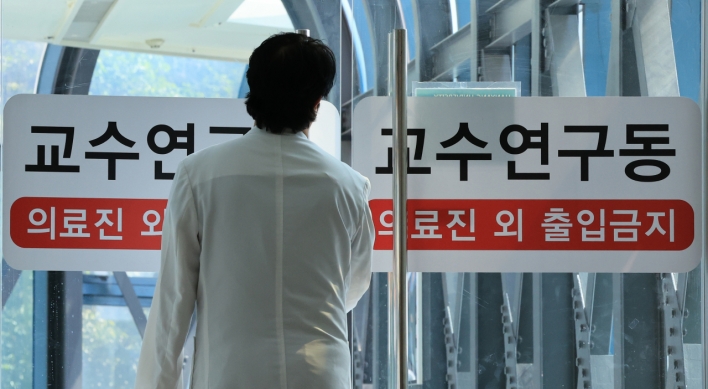[William Pesek] Is biggest short selling scam hiding in plain sight?
By 류근하Published : June 15, 2011 - 18:31
Buy a farm house in the middle of nowhere, pick up a gun or two, prepare for hyperinflation and brace for a catastrophic bankruptcy. Thirty minutes with hedge-fund manager J. Kyle Bass has you wanting to do all of the above.
The head of Dallas-based Hayman Advisors LP isn’t thinking about Greece or even Spain but Japan, the world’s third-biggest economy. He says his bet against Japanese government bonds is even “more compelling” than his gamble to sell short U.S. subprime-mortgage debt, which earned him $500 million in 2007.
Shorting Japan has been a losing proposition in recent years. But the earthquake, tsunami and nuclear crisis altered the outlook for a nation whose debt is more than double the size of the economy. Bass says a collapse is inevitable, making Japan’s 10-year bonds ― they yield 1.3 percent, among the lowest in the world ― a natural for a bear investor.
His argument is this: Japan now spends half of its central government revenue on servicing debt. This task won’t get any easier as the country’s population ages and shrinks ― provided rates stay the same. What’s more, the price tag for the earthquake and its effects will far exceed Japan’s initial $300 billion estimate, pushing the country over the edge. In Bass’s view, the biggest asset bubble ever is hiding in plain sight.
Is Bass right? He’s correct that the world isn’t paying enough attention to Japan’s debt bubble. Yet history probably won’t be kind to his wager on a crash that throws Asia’s wealthiest nation into chaos.
“We’ll look back at this, I don’t know when, maybe five to seven years from now, and we’ll say it was the most obvious scenario we’ve ever seen in our lives,” Bass said at a conference in New York last week.
The timeline: Greece, Europe’s most-troubled country with 10-year yields of almost 16 percent, will probably default first as its population rejects austerity and its economy goes into reverse. A visceral reaction in credit markets will follow and claim other victims.
“Once you see sovereign dominos begin to fall, Japan will be in the spotlight immediately,” Bass said.
Not everyone is quite so certain. Edward Rogers, chief executive officer at Tokyo-based Rogers Investment Advisors, told me he’s heard countless predictions that the bond market would implode and devastate the economy. He says people tend not to make much money betting against Japanese debt.
“If you think there isn’t enough money in Japan to finance the future you don’t know where the money is,” Rogers said, who has 25 years of experience in Japan.
Consider this: Japan’s postal system controls the world’s largest bank; households are sitting on savings in the neighborhood of $15 trillion; the country holds $1.06 trillion in currency reserves, second only to China; the unique structure of Japan’s bond market keeps about 95 percent of public debt in domestic hands.
There is an even bigger crack in Bass’s argument. Bonds are the main financial asset held by everyone, from banks to pension funds to insurance companies to consumers. The question is, Where would they put their money if they sold? U.S. Treasuries? Don’t count on it. Japanese have more confidence in domestic assets than anything made in the U.S.
Japan’s government would wage a powerful battle to maintain calm. Authorities would intervene in the markets, as they did in the past when stocks crashed. The central bank would be sure to purchase loads of debt to keep yields from surging. All this explains why betting against Japanese bonds can be so hazardous.
Bass and his ilk have a point when they say Japan must learn to grow without the artificial stimulants of huge government deficits and near-zero interest rates. That was the case even before the disaster in northeastern Japan. Japan’s need to rebuild will only further weigh down a dismal national balance sheet.
Political disarray doesn’t help. On June 2, Prime Minister Naoto Kan survived a no-confidence vote. Against this backdrop of petty politics, roughly 100,000 people are homeless in the northeast and radiation continues to spew from damaged nuclear reactors.
In nine years in Japan, I’ve never seen so many Japanese so disillusioned by the state of affairs in Tokyo. News last week that gross domestic product shrank at an annualized 3.5 percent rate in the three months ended March 31 only heightened the sense that the political leadership is paralyzed and ineffectual.
While there are angles for short-sellers to exploit, Japan isn’t the next Greece. The next few years won’t be pretty or smooth, but the idea that they will end in default and economic devastation seems farfetched.
By William Pesek
William Pesek is a Bloomberg View columnist. The opinions expressed are his own. ― Ed.
The head of Dallas-based Hayman Advisors LP isn’t thinking about Greece or even Spain but Japan, the world’s third-biggest economy. He says his bet against Japanese government bonds is even “more compelling” than his gamble to sell short U.S. subprime-mortgage debt, which earned him $500 million in 2007.
Shorting Japan has been a losing proposition in recent years. But the earthquake, tsunami and nuclear crisis altered the outlook for a nation whose debt is more than double the size of the economy. Bass says a collapse is inevitable, making Japan’s 10-year bonds ― they yield 1.3 percent, among the lowest in the world ― a natural for a bear investor.
His argument is this: Japan now spends half of its central government revenue on servicing debt. This task won’t get any easier as the country’s population ages and shrinks ― provided rates stay the same. What’s more, the price tag for the earthquake and its effects will far exceed Japan’s initial $300 billion estimate, pushing the country over the edge. In Bass’s view, the biggest asset bubble ever is hiding in plain sight.
Is Bass right? He’s correct that the world isn’t paying enough attention to Japan’s debt bubble. Yet history probably won’t be kind to his wager on a crash that throws Asia’s wealthiest nation into chaos.
“We’ll look back at this, I don’t know when, maybe five to seven years from now, and we’ll say it was the most obvious scenario we’ve ever seen in our lives,” Bass said at a conference in New York last week.
The timeline: Greece, Europe’s most-troubled country with 10-year yields of almost 16 percent, will probably default first as its population rejects austerity and its economy goes into reverse. A visceral reaction in credit markets will follow and claim other victims.
“Once you see sovereign dominos begin to fall, Japan will be in the spotlight immediately,” Bass said.
Not everyone is quite so certain. Edward Rogers, chief executive officer at Tokyo-based Rogers Investment Advisors, told me he’s heard countless predictions that the bond market would implode and devastate the economy. He says people tend not to make much money betting against Japanese debt.
“If you think there isn’t enough money in Japan to finance the future you don’t know where the money is,” Rogers said, who has 25 years of experience in Japan.
Consider this: Japan’s postal system controls the world’s largest bank; households are sitting on savings in the neighborhood of $15 trillion; the country holds $1.06 trillion in currency reserves, second only to China; the unique structure of Japan’s bond market keeps about 95 percent of public debt in domestic hands.
There is an even bigger crack in Bass’s argument. Bonds are the main financial asset held by everyone, from banks to pension funds to insurance companies to consumers. The question is, Where would they put their money if they sold? U.S. Treasuries? Don’t count on it. Japanese have more confidence in domestic assets than anything made in the U.S.
Japan’s government would wage a powerful battle to maintain calm. Authorities would intervene in the markets, as they did in the past when stocks crashed. The central bank would be sure to purchase loads of debt to keep yields from surging. All this explains why betting against Japanese bonds can be so hazardous.
Bass and his ilk have a point when they say Japan must learn to grow without the artificial stimulants of huge government deficits and near-zero interest rates. That was the case even before the disaster in northeastern Japan. Japan’s need to rebuild will only further weigh down a dismal national balance sheet.
Political disarray doesn’t help. On June 2, Prime Minister Naoto Kan survived a no-confidence vote. Against this backdrop of petty politics, roughly 100,000 people are homeless in the northeast and radiation continues to spew from damaged nuclear reactors.
In nine years in Japan, I’ve never seen so many Japanese so disillusioned by the state of affairs in Tokyo. News last week that gross domestic product shrank at an annualized 3.5 percent rate in the three months ended March 31 only heightened the sense that the political leadership is paralyzed and ineffectual.
While there are angles for short-sellers to exploit, Japan isn’t the next Greece. The next few years won’t be pretty or smooth, but the idea that they will end in default and economic devastation seems farfetched.
By William Pesek
William Pesek is a Bloomberg View columnist. The opinions expressed are his own. ― Ed.



![[KH Explains] Will 6-day workweek for executives help Samsung avert crisis?](http://res.heraldm.com/phpwas/restmb_idxmake.php?idx=644&simg=/content/image/2024/04/21/20240421050096_0.jpg&u=20240421164408)


![[AtoZ into Korean mind] Humor in Korea: Navigating the line between what's funny and not](http://res.heraldm.com/phpwas/restmb_idxmake.php?idx=644&simg=/content/image/2024/04/22/20240422050642_0.jpg&u=)





![[Herald Interview] Why Toss invited hackers to penetrate its system](http://res.heraldm.com/phpwas/restmb_idxmake.php?idx=644&simg=/content/image/2024/04/22/20240422050569_0.jpg&u=20240422150649)





![[Herald Review] Xdinary Heroes kicks off five-month-long project with solo concert, teases new album](http://res.heraldm.com/phpwas/restmb_idxmake.php?idx=652&simg=/content/image/2024/04/22/20240422050539_0.jpg&u=20240422152154)
![[Today’s K-pop] Illit logs 100m Spotify streams with debut song](http://res.heraldm.com/phpwas/restmb_idxmake.php?idx=642&simg=/content/image/2024/04/22/20240422050650_0.jpg&u=)